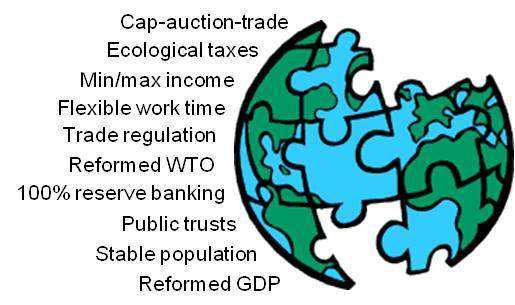Elitist Growth by Cheap Labor Policies
by Herman Daly
A front-page story in the Washington Post might have considered other reasons why growth has not led to more employment, besides simply claiming that growth has been “too slow.” First, the jobs that workers would have gone back to have largely been off-shored as employers sought cheap foreign labor. Second, cheap foreign labor by way of illegal immigration seems to have been welcomed by U.S. employers trying to fill the remaining jobs at home. And third, jobs have been “outsourced” to the consumer (the ultimate source of cheap labor), who is now his own checkout clerk, travel agent, baggage handler, bank teller, gas station attendant, etc.

Instead of wondering why economic growth has been so slow, consider the structure of our immigration policies. (Image: CC BY 2.0, Credit: Damian Bariexca)
These obvious but unmentioned facts suggest other policies for increasing employment beside the mindless call for more “growth,” gratuitously labeled “economic growth” when on balance it has become uneconomic.
Let us consider each of the three reasons and related policy implications a bit more.
First, off-shoring production is not “trade.” The good whose production has been off-shored is sold in the USA to satisfy the same market that its domestic production used to satisfy. But now, thanks to cheap foreign labor, profit is greater and/or prices are lower, mainly the former. Off-shoring increases U.S. imports, and since no product has been exported in exchange, it also increases the U.S. trade deficit. Because the production of the good now takes place abroad, stimulus spending in the USA simply stimulates U.S. imports and employment abroad. Demand for U.S. labor consequently declines, lowering U.S. employment and/or wages. It is absurd that off-shoring should be defended in the name of “free trade.” No goods are traded. The absurdity is compounded by the fact that off-shoring entails moving capital abroad, and international immobility of capital is one of the premises on which the doctrine of comparative advantage rests—and the policy of free trade is based on comparative advantage! If we really believe in free trade, then we must place limits on capital mobility and off-shoring. Budget deficits, printing money, and other measures to stimulate growth no longer do much to raise U.S. employment.
Second, for those jobs that have not yet, or cannot easily be off-shored (e.g., services such as bartending, waiting tables, gardening, home repairs, etc.), cheap foreign labor has become available via illegal immigration. U.S. employers seem to welcome illegal immigrants. Most are good and honest workers, willing to work for little, and unable to complain about conditions given their illegal status. What could be better for union busting and driving down wages of the American working class? The federal government, ever sensitive to the interests of the employing class, has done an obligingly poor job of enforcing our immigration laws. Immigration reform requires deciding how many immigrants to accept and who gets priority. All countries do that. Most are far more restrictive than the USA. Whatever reforms we make, however, will be moot unless we control the border and actually enforce the laws we will have democratically enacted. Ironically our tolerance for illegal immigration seems to have caused a compensatory tightening up on legal immigrants—longer waiting periods and more stringent requirements. It is cheaper to “enforce” our immigration laws against those who obey them than against those who break them—but quite unfair, and perceived as such by many legal immigrants and people attempting to immigrate legally. This is a very perverse selection process for new residents.

The reduction in service sector jobs further decreases the distribution of income in our country (Image: CC BY-SA 4.0, Credit: Jamie Tubers)
Third, the automation of services of bank tellers, gas station attendants, etc. is usually praised as labor-saving technical progress. To some extent it is that, but it also represents labor-shifting to the consumer. The consumer does not even get the minimum wage for his extra work, even considering the dubious claim that he enjoys lower prices in return for his self-service. Ordinary human contacts are diminished and commerce becomes more sterile and impersonally mechanical. In particular interaction between people of different socio-economic classes is reduced. I remember at the World Bank, for example, that the mail clerks were about the only working class folks that professional Bank staff came into daily contact with on the premises. Even that was eliminated by automated carts that delivered mail to each office cubicle. While not highly productive, such jobs do provide a service, and also an entry into the work force, and help distribute income in a way more dignified than a dole. Reducing daily contact of World Bank staff with working class people does nothing to increase sensitivity and solidarity with the poor of the world. And of course this does not only apply to the World Bank. The idea that it is degrading to be a gas station attendant or mail handler, and that we will re-educate them to become petroleum engineers or investment bankers, is delusional.
Excuse my populism, but the working class in the USA, as well as in other countries, really exists and is here to stay. Cheap labor policies in the name of “growth and global competitiveness” are class-based and elitist. Even when dressed in the emperor’s new wardrobe of free trade, globalization, open borders, and automation, they remain policies of growth by cheap labor, pushing employment and wages down and profits up. And we wonder why the U.S. distribution of income is becoming more unequal? Obviously it must be because growth is too slow—the single cause of all our problems! That we would be better off if we were richer is a definitional truism. The question is, does further growth in GDP really make us richer, or is it making us poorer by increasing the uncounted costs of growth faster than the measured benefits? That simple question is taboo among economists and politicians.
 Herman Daly is CASSE’s Chief Economist, Professor Emeritus (University of Maryland), and past World Bank senior economist.
Herman Daly is CASSE’s Chief Economist, Professor Emeritus (University of Maryland), and past World Bank senior economist.





13th September 2010
Dear Herman Daly,
Ever since we first spoke briefly at, I think, The Other Economic Summit in London in June 1984 and then chatted a few years later at the Schumacher Lectures in Bristol, I’ve been plugging away over the years at various environmental jobs. But most of them ended badly; it’s not easy to bite one’s tongue when told to represent one’s employer as ‘sustainable’ or ‘green’ when one knows full well that even major a improvement in the efficiency of one firm or government department doth not a sustainable economy make.
But, naturally, employers want good sound-bites rather than condensed lectures about systems dynamics and why becoming more efficient will not make them, or our global economy, sustainable. Needless to say, my employment record is patchy to say the least. So it is with much dismay that we all can note that not as much has changed over the last 25 years as we all had hoped it might. Nevertheless, we keep on going one way or another.
Perhaps we need a single mechanism that appeals to people of all political hues, a way of saying “we’ve had enough” of corrupt politics, thoughtless policies, declining habitats, greedy employers, diminishing resources, the threat of peak oil and a failing banking system based on debt and exponential growth – something very simple that we all as citizens can sign up to. To that end, I’ve created The Sirisuk Declaration.
In essence, it is asking ordinary people to voluntarily sign up to a generous yet limited cap on their income and capital accumulation. Since the banking crisis, much has been said about bonus culture, fat cats and the tendency for our politicians to want to maintain a poor working class at home and abroad to keep the consumer machine running. So let’s make it a simple ethical issue; one that need not include the complexities of economic theory or environmental systems dynamics. If you or readers of this blog think the idea worthwhile, I urge you to read the Declaration and the accompanying explanations at:
http://www.sirisuk.org
If you’d like to sign the Declaration on-line, follow the links on the site.
Of course, it is not the whole answer but it is at least an ethical position from which many things might spring.
Very best wishes,
Nick Nakorn
Devon, England
Herman Daly is right up there with Richard Heinberg in ability to articulate what should be obvious – but clearly is not – to the masses and especially our policymakers. Thank you, Herman Daly. I’d like to print this and post it at every bus stop, on every street corner, and especially in the bathroom stalls at the White House, Senate and House office buildings.
Dave Gardner
Producing the documentary
Hooked on Growth
http://www.growthbusters.org
Mr. Daly
I have been following your work since my studies in environmental economics in the early 1970s. Thank your for this article which should be published in every newspaper in the United States and should be distributed to every member of congress.
You have addressed what virtually everyone in our political arena seems to be missing. Neither the left nor the right understands that growth in the United States is almost completely ineffective in addressing the quantity and quality of employment. The next elections will settle nothing. Regardless of who wins, we will pursue a policy which is irrelevant to the problems at hand. And this goes way beyond employment, of course, as it deals with quality of life and the future viability of the planet.
While I generally agree with the rest, I think it’s unfair to call what we have in the rich world today “open borders”. If it were really open, people would not need to take terrible jobs that are terrible purely in the name of profit. I am a legal US immigrant, and while I agree that the requirements to get me here were far, far too high and difficult to meet, I blame that on the border being too impenetrable, not too open. Whether you come in legally or ‘illegally’, the system is designed to take as much money from you as possible. The state is indeed stuck between its xenophobia and desire for cheap labour, but ‘illegals’ are my allies, not my opponents.
I’m more inclined to allow more mobility for labor than less for capital, but something has to give. The current arrangement of mobile capital and fixed labor is grossly unfair. Your populism can be excused, but do take care to prevent it from degenerating into crass nationalism.
Thanks Herman for your clear analysis and recommendations. Coincidentally, I just posted a review Prosperity without Growth at:
http://8020vision.com
Readers may find that interesting.
Edward D. Hess, the author, has a heretical thought: Growth may not be good. In Smart Growth, he questions the four major assumptions behind the conventional wisdom of corporate success, which he calls the “growth mental model” (GMM): that businesses must grow or die, that growth is unequivocally good, that growth should be smooth and continuous, and that quarterly earnings are the primary measure of success.
Couple that with Joseph Stiglitz views on how we measure growth (http://8020vision.com/2009/06/22/nobel-laureate-joseph-stiglitz-on-sustainability-and-growth/), and we start to get a picture of steady state wellbeing.
A concern I have though: in an environment of increasing population, with scarcity of resources mounting, and climate change and water challenges, the basic commodities a family needs to survive will become more precious. How do we manage the transition into what I call The New Economy of Scarcity, such that the delicate balance between corporate and individual wellbeing is preserved and fostered?
Import tariff barriers to level the manufacturing playing field would slow or stop the offshoring of production… but would they also stop the ability of poorer nations to develop by supplying us and benefiting from the “trickle down of wealth from the West?
Dave,
very best of luck with the film.
Nick